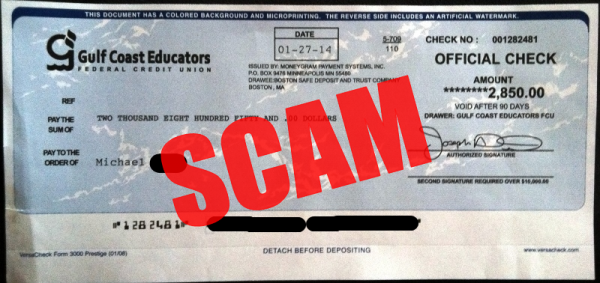via CareerBuilder.com …
What is a Check Cashing/Payment Processing Scam?
Fraudulent companies will send out phony job positions such as “Accounts Receivable Clerk,” “Finance Manager,” or “Mystery Shopper.” These fake job offers are commonly delivered through email and usually claim to have come through online Job Boards or include forged legitimate business names in order to make the messages appear credible.
The phony job offers describe a position where you are to collect funds from the fraudulent company’s “clients” and then transfer money back into their or another agent’s bank account. This may be conducted through Wire Transfer, Check, or even direct ACH transactions.
The fraudulent company will usually mail the Job Seeker a fake check (it might be a Cashiers, Money Order or Travelers Check) and also provide instructions on how to cash the checks and where to transfer the money. (Other variations of the scam instruct the Job Seeker to accept a direct ACH transfer of funds or to accept a Wire Transfer. Some scams will use online payment services instead of bank accounts.)
The “employer’s” instructions will request to have the funds deposited into a bank account under the Job Seeker’s name. The Job Seeker is told to keep a small percentage of the money as commission. The bank wires the funds immediately and, a few days later, will discover that the original check from the “employer” is fraudulent.
By the time the check is identified as fraudulent, the scammer already has their money and the “employee” is left with a negative or frozen bank account. The bank holds the person on the account liable for the funds and, in certain cases, will seek legal action. As this is considered illegal activity, the “employee” can possibly face charges, whether they knowingly participated in the money laundering process or were tricked.
What are the signs?
- Company initiates contact with you from a generic or free online web email address.
- Company web site domain was recently registered.
- Company requires you to deposit checks/money orders or accept bank ACH transfers into a bank account and then wire the funds to another source.
- Company is not located in the United States or is conducting business only with clients overseas.
- Misspelled words, grammatical errors appear in the job offer and corresponding emails.
- Job description promises high income for very little time and effort; no experience necessary.
- Employment starts without a face to face interview.
- Company information cannot be verified.
- Employer requires personal information without providing a detailed job description.
- If the job sounds “too good to be true”, it probably is.
How to protect yourself when looking for a job?
Research the company that is offering the position.
Check the internet and Better Business Bureau for the company name, phone number, and location. If you are suspicious of the posting and have a phone number available, place a call to the company and inquire about the job details. Visit our resources page which provides you with helpful websites to enhance your job search and research if there is negative feedback on a company. Due to our privacy policy, CareerBuilder cannot provide additional information, other than the information listed on the posting.
Think before you apply.
If a company is offering a high wage or salary for very few hours of minimal work, it would not be ideal to forward them your personal information. It’s best to investigate before sending any of your information to a potential employer.
Seek local employment.
If a company states to be located overseas, first research the company. Next, contact the company directly, inquiring about the opportunity being offered. You may also submit a ticket to our Trust and Site Security Team to verify the legitimacy of a company or opportunity.
Do not cash/wire/ship any checks or products.
Companies will never ask you, for any reason, to set up a bank account, to deposit checks, or to accept direct fund transfers into your own account and then wire them to another source. If you receive an email requesting you to do so, cease communication with the company, and contact CareerBuilder immediately.
Ask questions.
Ask specific questions to the employer that is offering the position. The posting should provide enough information about the position, however if a description seems vague, report the job to Trust and Site Security. You can use the “Report this Job” form to notify us of questionable jobs posted on our web site or forward any suspicious job offers you received in email to TSST@CareerBuilder.com.
Never provide sensitive personal information during the initial application process.
Be extremely careful providing information such as your Social Security number, Drivers License number, Date of Birth, or other sensitive information that might make it easy for a fraudster to use that information to steal your identity. We recommend that you never place this type of information on your resume. However, please keep in mind that most companies will require your social security number when filling out an actual application. If you are asked to fill out an application online, on that employer’s website, you can check to see if that page is secure (the address bar should read “https:”).
Pending that outcome, it is entirely up to your discretion as to whether you would like to apply online or not. You may want to contact the company directly to find out if there are other methods of application.
For more information on check cashing/payment processing scams, visist FakeChecks.org.



